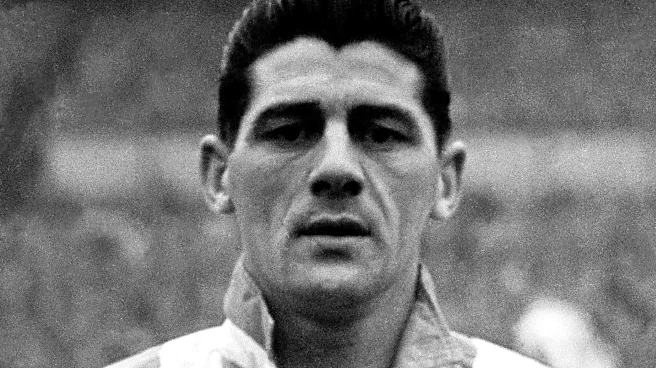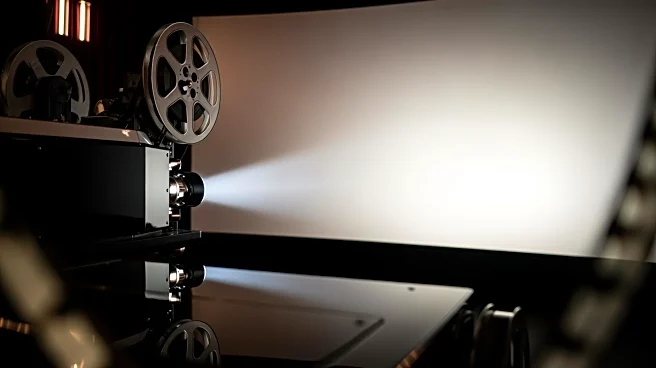Born this day in 1923, Trevor Ford was a Swansea boy. His dad, who had been a military PT instructor during the Great War, encouraged his son to play football and designed a number of drills and programmes
that developed his core strength as well as his ability to kick with both feet and strike the ball with venom.
Young Ford played school football in Swansea and came to the attention of the Welsh Under-14 selectors as centre-half and captain of his school team. Having been chosen to represent Wales in the age-grade Home Nations competition, he broke his ankle in a school game just days before the first scheduled match against Scotland in 1937. Ford was said to have been devastated. He did, however, recover and went on to represent his country in the Under-15 age grade at cricket, in which he also excelled as a fast bowler.
Despite being only fifteen years old, he played for the local men’s side Tower United as a full-back (and was signed on amateur forms by Swansea in 1942). However, these were turbulent times across Europe, and war was breaking out.
Ford left school at fifteen and went to work in the local steelworks, making bomb casings. He completed his war service in 1945/46 and appeared regularly for the service football team, where the Sergeant-Major in charge of the team moved him successfully to centre-forward. He scored forty-one goals in a variety of military matches throughout this period, as well as guesting for Leyton Orient, scoring three goals in four games.
He returned to Swansea upon the resumption of league football and scored nine goals in sixteen games for the Swans in Division Two in 1946.
In January 1947, Aston Villa paid what seemed at the time a substantial fee for a youngster untried and untested in the top tier, of £9,500 (plus forward Tommy Dodds). Ford repaid them with sixty-one goals in one hundred and twenty-eight appearances as he fashioned a fine reputation as one of the toughest and most effective young goalscorers of his generation.
In the 1949/50 campaign, Sunderland manager Bill Murray had led his expensively assembled team to third in Division One. They missed the title by one point, and Murray and the board were determined to drive the team to the next level. However, the 1950/51 season had not started well, with the Lads in nineteenth position by October. Murray perceived a lack of goals in the big games was the problem and acted by paying a national record fee of £29,500 for Ford, who was by this point in his career something of a football celebrity. He was given a family house upon signing and a part-time job as a car salesman arranged by the club to augment his wages, which were fixed at a national maximum (probably around £12 weekly with a £10 signing-on fee). He was also allegedly given a brown paper package with £250 enclosed in a then-illegal under-the-counter payment for signing on.
Ford was quickly into his stride, famously scoring a hat-trick on his home debut, uprooting a goalpost with one of his cannonball shots, as well as breaking the jaw of an opposition defender in what the referee deemed a fair challenge (for the time), capped off by charging the opposition goalkeeper into the back of the net as he grabbed the ball. It was a typical display from Trevor Ford, and most Sunderland fans came to appreciate his all-action style.
However, not everyone was happy! Some of Ford’s teammates were unhappy at the manner in which the popular Dickie Davis, who had been playing centre-forward, was cast aside. Davis had done little wrong, as his record of seventy-nine goals in one hundred and fifty-four appearances before he left Sunderland suggests.
Ford himself appears to have been a brutally plain-speaking chap at times and rubbed some of his teammates up the wrong way, careering about the club car park every month in the latest model from the car dealership he “worked for”, as well as letting all his teammates know the details of the deal that had brought him to Sunderland. One player in particular seems to have taken exception to Trevor Ford’s presence, and his disdain would lead to a major impasse between the Welsh goalscorer and Len Shackleton for the duration of Ford’s time at the club.
Stan Anderson, who shared a dressing room and a number of the games they played together, was asked many years later about the reasons for the disagreement. He remarked that he could not say, but was convinced ‘Shack’ did not even like the way Ford combed his hair, such was the depth of bad feeling.
Despite the ill feeling, Ford was still producing goals and was top goalscorer in two of the three full seasons he played for the club, though it has to be said, for all the money spent, there was little sign of any real success following.
In 1950/51, Sunderland finished 12th, as Ford’s seventeen goals in thirty-one games helped propel the Lads away from the relegation dogfight. Season 1951/52 saw another 12th-place finish and twenty-two goals in forty-one appearances for Ford. During this period, Sunderland turned down a massive bid from Fiorentina, which would have seen Ford earning £2,000 per year plus a new car and house.
Another twenty-two goals were scored, this time in thirty-three games, by Ford in 1952/53 as Sunderland improved, but only slightly, to a 9th-place finish.
In the 1953/54 campaign, Sunderland got off to a terrible start, winning only five games in the first seventeen and sitting in the relegation places for much of this period. In a game at Villa Park, things came to a head with Ford and Shackleton. The Welshman accused Shackleton of not passing to him and then refused to play with the mercurial winger – inside-forward. When he was “rested” by the club in the next game, Ford considered his position untenable and tabled a transfer request.
Bill Murray attempted to broker peace between the two players, asking them to shake hands, but Ford refused, and he and ‘Shack’ only played together one more time, in Ford’s very last game against Liverpool at Roker Park in a 3-2 victory. Despite the continuing interpersonal difficulties, he still managed nine goals in twelve appearances in his last season on Wearside.
Trevor Ford’s last goal for Sunderland was scored at Roker Park in a thrilling 4-3 victory against Spurs two weeks before his last game (Shackleton was injured). Despite the victory, Sunderland remained bottom of the table. In December 1953, Ford was transferred to Cardiff City for another record fee of £30,000. This transfer fee stood as a Sunderland record for seventeen years until the fee received for Johnny Crossan in 1965 from Manchester City of £42,000 surpassed it.
His three years with Cardiff would see him make one hundred and ten appearances, scoring sixty-eight goals.
In 1956, Trevor Ford published an autobiography entitled “I Lead the Attack”. The very first chapter was entitled “Under the Counter” and detailed alleged illegal payments made to him by Sunderland. His intention, we are led to believe, was to bring about an amnesty for players and bring forward a much-needed discussion regarding the maximum wage.
The revelations resulted in an immediate suspension for Ford. This was not what he had hoped for; disappointed and upset, he announced his retirement from the game.
Future Sunderland manager George Hardwick enticed Ford back into the game when he signed for PSV in Holland, where Hardwick was manager. Ford played fifty-eight times for PSV, scoring twenty goals alongside legendary forward Coen Dillen.
Ford had also appealed his suspension from the game in the UK and eventually won his case and was allowed to return to England to play. In 1960/61, he played briefly for Newport, Romford, and Gloucester City. In total, he played 411 games, scoring 206 goals.
Trevor Ford won thirteen Welsh caps whilst with Sunderland. He actually made his debut against England at Roker Park in 1950 and scored both Wales’ goals in a 4-2 defeat. He played thirty-eight games in all for Wales, scoring twenty-three goals.
Ford retired in 1961 and spent some time working in the motor trade. In 1955, he turned out for Glamorgan Cricket Club. He was in the crowd watching Glamorgan play Nottinghamshire in 1968, aged forty-four years old, and memorably took the pitch as a replacement fielder in the game that Sir Garfield Sobers scored 6×6 off the bowling of Malcolm Nash.
Whilst his time with Sunderland was not a period of great success for the team, individually Trevor Ford’s statistics are impressive. He is fourth in our table of all-time best strike rate with 70 goals in 117 games, behind Dave Halliday in first position with 165 goals in 175 games. Ford is eighth in the table of fastest to fifty goals, taking 85 games (Johnny Campbell heads that table, taking only 48 games). Ford is also joint tenth in the most hat-tricks table. He shares this with Raich Carter, as both players scored four hat-tricks. They both sit behind number one Dave Halliday, who scored 15 hat-tricks in all.
My old man was the first person who ever mentioned Trevor Ford to me; he said he had a huge work-rate and was a very accurate goalscorer. He also said he was the toughest forward he ever saw play, but he displayed this toughness in a just-legal kind of way, as he was never booked or sent off, despite his reputation.
I leave the final words on Trevor Ford to one of his playing colleagues, Billy Bingham, who said of the Welshman: “He was the bravest player I ever played with. He took some terrible knocks from goalkeepers, but he also knew how to dish it out, and he never complained to the ref.”









